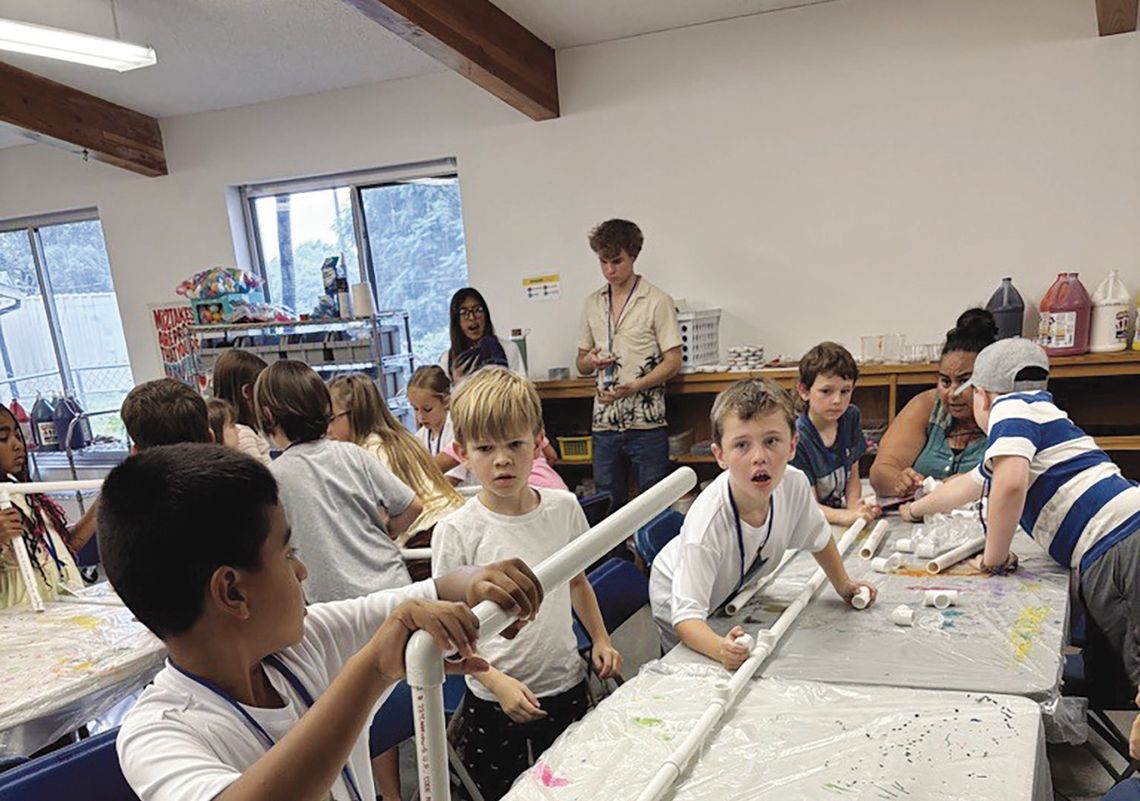Camp CommUnity reduces financial barriers, fights academic loss
WIMBERLEY — Summer is a time for families to organize their calendars, go shopping for all of the essentials or pack up the car and drive several miles to get their kid to camp for the day. However, for others, summer camp is not always an option — that’s where Camp CommUnity (CU) steps in to provide a low-cost, affordable day camp for students entering kindergarten through sixth grade.
Located at Wimberley ISD’s Scudder Primary School campus, CU offers a variety of activities for its campers each day from hands-on science, technology, engineering, art and math (STEAM) projects and even electives, such as cooking, podcasting and photography. Campers also get to enjoy daily outdoor activities and weekly trips to the Wimberley Village Library.
This will be the third summer that CU has been in effect. Founder Amber Wakem has had a nonprofit, called Start-Up Kids Club, focused on entrepreneurship, for eight years, but when she moved to Wimberley in the middle of the COVID-19 pandemic, the nonprofit went virtual. During that transition, she realized how many gaps there were in the community, specifically for families that face financial barriers, leading her to create CU underneath her already-established nonprofit’s umbrella.
“Our nonprofit had worked a lot already within the out-of-school time space and with kids that face disabilities or financial barriers and so, it wasn't anything new for me, but we decided to kind of pivot it a little bit to meet the needs of our specific community in Wimberley. It's not very well-known because a lot of people look at Wimberley [like] we're this really affluent community and while there's a lot of money here, there's also a lot of inadequacies,” Wakem explained. “One in three kids within Wimberley ISD is financially disadvantaged … Three years ago, we opted to basically try to fill that gap and create a program that gave kids a place to go, specifically those who couldn't afford [going to camp] during the summer, while also keeping in mind that families who have the ability to send their kids to camp need options, too.”
Approximately 70% of the students that CU serves are going to be financially disadvantaged, Wakem said. The camp works with WISD to where the school district will send out information to those who are on the free and reduced lunch program, informing them that they could be eligible to receive a scholarship.
CU reserves a set number of spaces each week that the camp is available to offer free of charge to students whose families could benefit from the extra support, which is a component that is near and dear to Wakem.
“[I love] getting to see the kids and give them an opportunity that is unlike anything that they get to experience before. I grew up very, very low income. We were homeless for three years of my life as a child and so, I was one of those kids, so I get it and not a lot of people that work in the space can make that personal relationship [and relate] to what some of these kids are experiencing and the hardships that they face,” she said. “Just knowing that we're giving them an opportunity to potentially plant seeds, they can go on and change their story and then, impact other people’s lives accordingly.”
Parents can expect for their campers to do a little bit of everything. The sessions are themed based on Wimberley High School’s practicum tracks, which could be helpful for the parents who want to prepare their students when they reach freshman year and it’s time to decide what track they will be going on.
Eighty percent of a child’s day is spent outside of school and research shows that when children have access to participate in organized, high-quality, out-of-school time activities, it positively affects students educational and social/emotional outcomes, especially those who are at risk, according to CU’s website. The website continued to state that for every $1 invested in out-of-school time programming, the economic return of investment is between $4-$6 and can be seen in reduced drug and alcohol addiction, increased graduation rates, reduced crime rates and increased physical activity.
Being able to offer the hands-on programs that are at CU is important for the overall well-being of the child, Wakem said.
“Academic loss is real. I mean that, in itself, is real. If you're financially disadvantaged, you lose at a rate twice as much as your peers during summertime. You've got increase in child abuse. You've got an increase in neglect and food scarcity. And these are all really significant problems. When you're looking at communities where the school is the primary child care for these kids when parents go to work, when summer comes, that's where you have all of these problems,” Wakem explained. “From a systematic standpoint, they're giving these kids a space to go that’s safe and that’s engaging. You're not only helping them grow and thrive, you're actually adding to the economic return within our community, as well, because they're not getting in trouble, they're not doing some of the things that they might be doing or require some of the resources, then they might learn something that helped them basically change their cycle as they grow and move into the workforce themselves.”
This summer, CU is offering four full camps at 400 Green Acres Drive in Wimberley during the following weeks for students entering kindergarten through sixth grade. Camp runs from 8 a.m. to 3:15 p.m. daily, with an option for aftercare available until 5 p.m.
June 23-27
July 7-11
July 14-18
July 21-25
The full-week cost of the camp is $175, but aftercare for the week is $50. Families who do not currently qualify for WISD free and reduced lunch, but need scholarship assistance can contact [email protected].
To learn more about CU, and to register, visit www.campcommunity.org/camp.










